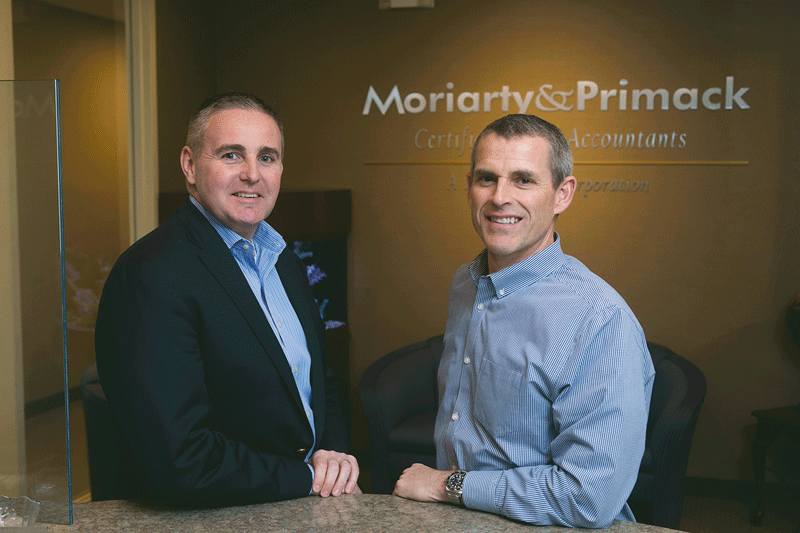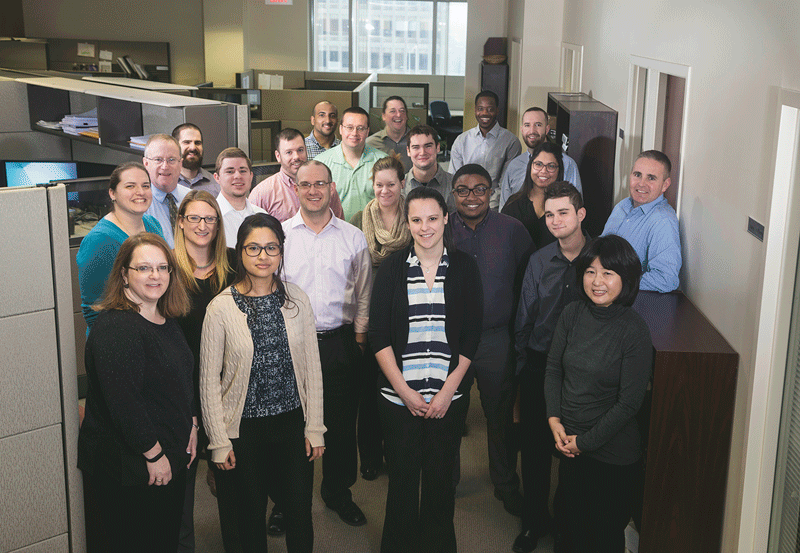
Moriarty & Primack Reflects on a Quarter-century of Growth
Taking Account

Principals Patrick Leary (left) and Doug Theobald
The field of accounting is broad, diverse, and constantly changing, so the leaders of Moriarty & Primack are rightfully proud that their firm has weathered those changes with near-constant growth and little turnover. They credit a culture of connection, where open communication is valued in the office and client relationships dig deeper than mere numbers on a ledger. As it approaches its second quarter-century, those are values the company intends to preserve.
After a quarter-century in business, it’s natural for an accounting firm to re-evaluate its place in the financial-services industry — particularly for a firm with the consistent growth record of Moriarty & Primack.
“We’re probably at the cusp where we’re not a small firm anymore, but not a large firm, either — maybe a medium-sized firm,” said Patrick Leary, CPA, Assurance Services partner with the firm, which now totals almost 40 employees. “So, what does that mean to our clients and how we market ourselves in the community?”
When he and other leaders of the Springfield-based firm sat down with BusinessWest recently, they talked about how the company’s evolution had sparked conversations, now ongoing, about its messaging and growth strategy going forward. What kept coming up was a wave of young talent.
“You can certainly say we’re younger than we were 10 years ago,” Leary said. “That certainly changes the firm’s culture — younger people with lots of energy, people who are building their careers, striving to move forward.”
They also bring their own, varied perspectives, said Douglas Theobald, Tax Services partner and the firm’s president, noting that they were recruited from both Western Mass. colleges and well outside the region, and hail from both accounting programs and other professions, bringing a richness of life experience to their jobs.
This group — which definitely doesn’t represent the old vanguard of “green-eyeshade accountants,” Leary noted — also bring key experience in modern modes of communication and connection.
“The world is changing so quickly, with social media and technology and such,” said Margie Smith, human resources director, “and they are really savvy in all those areas in a way that some of us older folks may not be.”
We’re probably at the cusp where we’re not a small firm anymore, but not a large firm, either — maybe a medium-sized firm.”
Conversely, noted Lisa Behan, CPA and director, the company’s leaders can model the close client relationships that have been a hallmark of Moriarty & Primack’s 24 years in business. “The only way to teach them that is to show them.”
To that end, Leary said, the firm’s leaders make an effort to draw younger employees into many of their client discussions, if only to help them gain experience in myriad areas. “That builds our bench; someday our clients will be going to them with these questions, and the more situations we throw our staff into, the better they’re going to be in their career.”
Smith said the younger employees appreciate that culture. “It helps them develop more quickly than they might otherwise. We also have an open-door policy here. Everyone is approachable, and they know they can come to anyone, anytime, with any questions. There’s a lot of collaboration here, and everyone is on a first-name basis. It’s not ‘Mr. Theobald’ or ‘Mr. Leary’; it’s Doug and Patrick. That open-door policy helps everyone work together and makes them feel like they can ask questions, that questions aren’t stupid.”
For this issue’s focus on financial services, Moriarty & Primack’s leaders spoke with BusinessWest about how asking the right questions, and answering them with a culture that prioritizes relationship building, has fostered continual growth since 1993, and likely more moving forward.
Making a Name
Richard Moriarty and Jay Primack were long-time employees of Coopers & Lybrand when they decided to put their own names over the door, using their experience and effective recruiting of talented CPAs to make their firm one of the standouts in the local accounting community. They started in a 1,000-square-foot office in One Financial Plaza, then expanded that footprint before moving one block down Main Street to Monarch Place in 2001.
Now in its second generation of leadership, said Theobald, the firm has come to focus on four key areas: Auditing services to business clients, nonprofits, and other business entities; tax-consultation and compliance services to business clients, individuals, and other segments; business-valuation work; and employee benefit plans.

From left, Doug Theobald, Margie Smith, Lisa Behan, and Patrick Leary say the company benefits from a culture of open communication.
“Those are our core service lines,” Leary added. “It’s a fairly traditional core set of services for a CPA firm of our size.”
Theobald said the firm is well-versed in virtually every industry, but its accountants aren’t afraid to consult with someone else in the company who might have broader experience in a certain field.
“We do collaborate internally amongst ourselves. Patrick may have more experience in the construction field than I have, and if I have a construction client, I can come to him with a question. And vice versa — he might come to me with a tax issue. That’s been very successful for us; we work with individual clients with a team approach, and try to use the best knowledge we can internally.”
That’s an important part of the culture, Leary added. “We tell our people that nobody here knows everything. To me, being a good CPA means asking a lot of questions. We’re not going to go to a client and just pretend we know all the answers.”
That emphasis on candor and communication appeals to Behan, who joined the firm last year from Owens & Co. in Connecticut. “I’ve seen the whole profession change over the past 10 to 20 years around relationships as opposed to technical expertise,” she said. “What’s really important to clients now is the trust, the connections, the relationships, the experience … a lot of intangibles around our relationships with clients. Twenty years ago, what we did was more of a commodity, and less personal.”
Theobald agreed. “The only way you can be successful in this business is by driving deep in relationships with your clients. They look to you as a confidant. We clearly bring technical expertise, or you wouldn’t be working with us, but it’s also a relationship built on trust. We wouldn’t have approached Lisa to join this business if she didn’t have both those skill sets.”
Smart Growth
Behan’s arrival was one example of organic growth, Theobald said, as she brought her own client base into the firm. Other growth over the years has been driven by acquisition, referrals, and a broadening of services.
“We realize we’ve got to continue to grow, and we give our staff as much opportunity as possible to grow,” he told BusinessWest, and that means drawing in new clients from near and far. “We are committed to Springfield, and we value the Pioneer Valley; we work here and reinvest in this community. But we’re also very active outside Western Mass. — in the Boston marketplace, in the Hartford marketplace. We realize that, if we want to grow the firm, we have to expand our footprint, and we’ve done this very successfully.”
To move forward, though — beyond that ‘medium-sized firm’ status — Moriarty & Primack is now examining its growth goals and formulating new marketing strategies, which is in some ways untilled ground.

A wave of new employees over the past decade, many of them young professionals, has given Moriarty & Primack an injection of energy and ideas.
“I think our success has been built off hard work and past successes with clients,” Theobald said. “We do very little in marketing, but get a lot of referrals — but we only get those referrals if clients have seen us do a good job, and are confident in our ability to work together, to bring high-end service with good ideas and good execution.”
Smith noted that the firm has also committed to boosting employee training and updating its technology and infrastructure to better serve clients, which is critical in an age when so much business is handled by electronic means.
“A lot of times growth is a byproduct of where the industry as a whole is going, and so much these days is done electronically,” Theobald said. “We can serve clients totally through electronic means. We might meet with a client twice a year but still do a lot of work with them throughout the year.”
Behan agreed. “Relationships can really be built and maintained electronically. We have clients on the West Coast … so much of it is phone and e-mail. If you stay on it and maintain these relationships, you don’t always have to be face to face with people anymore.”
Busy clients tend to appreciate doing business through those channels, because carving out an afternoon meeting can be a real commitment on their end, Leary added. “We get it. We know how clients work — they may wake up at 5:30, check their e-mail, and get a lot of work done during that quiet time.”
The challenge, Theobald said, is to be accessible at all hours, but respectful of the work-life balance that’s such a key factor in retaining talent in the Western Mass. marketplace “Young professionals don’t want to work 8 to 7 every day; they want that work-life balance, and that forces us as managers to run a business that can effectively serve clients but also be a good fit for the staff.”
Getting Involved
So far, it’s working, Theobald added. “We’re only as successful as our staff, and we have a low turnover rate, which translates into continuity of service and not having to retrain the staff every so often. Turnover is very disruptive to a firm, and that is maybe the best judge of what we are doing right as a firm.”
Moriarty & Primack keeps employees engaged in ways that go beyond their job description, he added — for example, though a social-action committee through which employees decide where to target the firm’s charitable resources, whether through dollars or events. “They like that; it’s empowerment. They’re contributing more than just in an accounting sense.”
The company also manages a mentorship program for younger staff, who have the opportunity to give and get feedback, Smith said. “They can help grow their own careers by talking to someone more experienced, and have someone watching out for them a little bit.”
These sorts of endeavors have myriad positive effects, Leary said, notably building employees’ knowledge — about their field and what’s happening in the community — which they can bring to bear in the future as they move throughout their careers.
As Moriarty & Primack looks to its second quarter-century, he went on, its leaders are drawing on history and experience to craft a vision of what they want to look like down the road.
“We’re a much larger firm than we were 10 years ago, and we’re a more diverse firm,” he told BusinessWest. “So we’re going through a strategic thought process: how do we get from here to there, how do we continue to distinguish ourselves from our competitors? The goal is to create a good strategy and execute it.”
It’s a vision that appeals to Behan. “I admire that Doug and Patrick are looking years down the road instead of looking back. They’re open-minded to how the firm might look in 10 years.”
It will certainly look much different — and has for a long time — from that small office Richard Moriarty and Jay Primack launched 24 years ago, Theobald said. “But we owe a lot to them for what they started.”
Joseph Bednar can be reached at [email protected]





